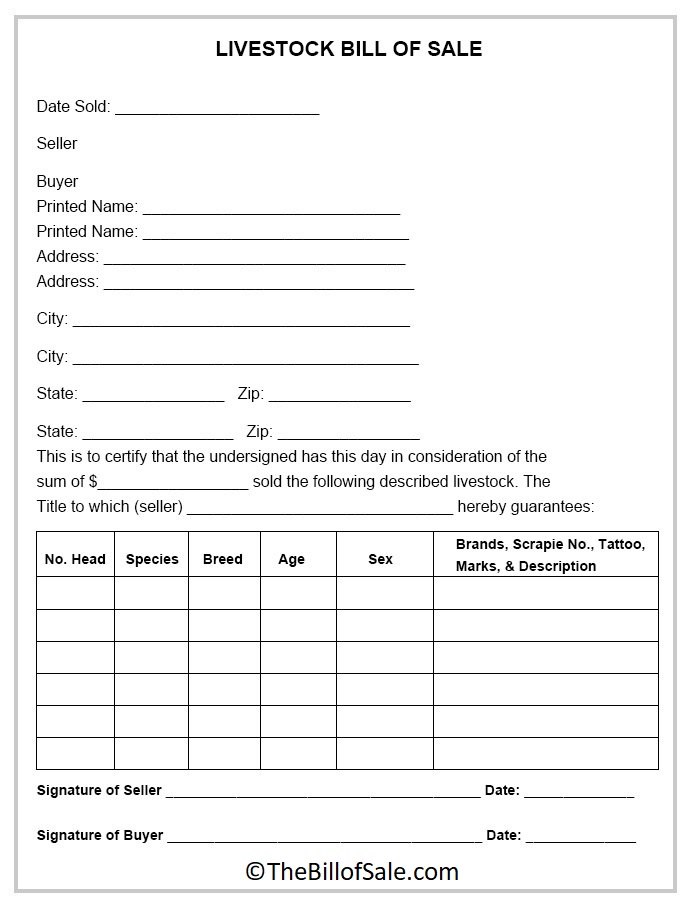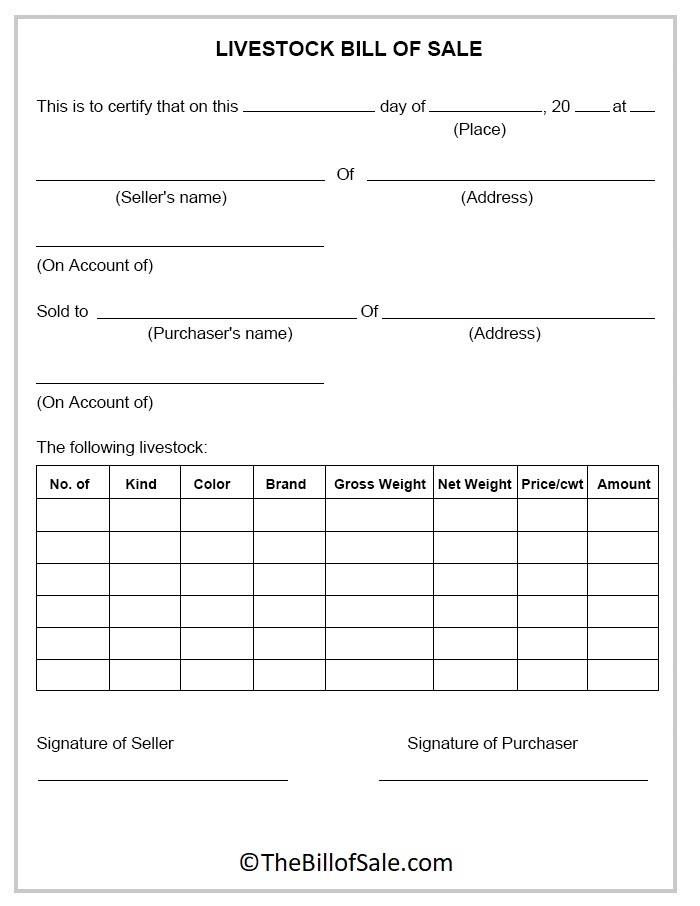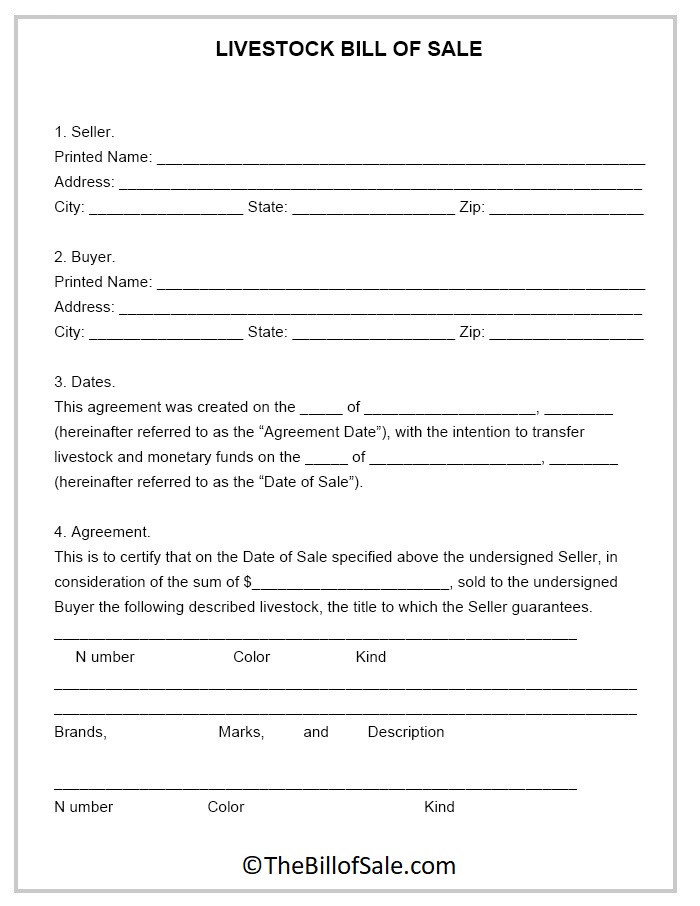Are you considering exchanging proprietorship of a cultivate creature to another person? In such a case, the Animals Charge of Deal frame will assist you fulfill this errand. This legitimate archive is planned particularly for the deal of animals, counting creatures like bovines, buffaloes, and bulls, to a modern buyer. It is fundamental to utilize this charge of deal to total any animals transactions throughout the USA. Within the taking after article, you may discover advance points of interest almost the charge and a printable format that can be used to draft the archive.
The animals charge of sale could be a broadly utilized record within the rural industry. It may be a pivotal record that includes all the vital data relating to the deal of animals from the dealer to the buyer. Furthermore, it serves as legitimate prove of the exchange of proprietorship between parties. In the event that you’ve got eagerly of offering any animals, it is basic to utilize this particular charge of deal.
Livestock Bill of Sale Form
The charge of deal is solely appropriate to the deal of cultivate creatures across the nation. Hence, when exchanging proprietorship of animals, whether through a common deal or a gift, this charge of deal gets to be a vital record.

The charge serves as prove of proprietorship and is entirely required beneath the Creature Security Act. It can be utilized for different cultivate creatures such as bovines, goats, chickens, buffalo, sheep, bulls, and more. The charge incorporates fundamental data around the animals and the parties included within the deal:
- Seller/Buyer Names
- Date of Sale
- Livestock Animal Name
- Seller/Buyer Addresses
- Additional Livestock Details (Age, Gender, Health, Vaccination, Sickness, etc.)
- Final Sale Price
- Advance Deposit
- Inspection Details
- Seller/Buyer Signatures
These details are crucial and must be as it should be supplied through the vendor whilst filling out the invoice of sale.
Dos and Don’ts When Selling Livestock
Selling livestock includes a completely unique duty because it relates to the sale of residing animals. Both the vendor and purchaser ought to uphold a experience of integrity and accountability in the direction of the welfare of the animals. Here are some essential hints to comply with:
Dos:
- Provide accurate information: Ensure that you offer sincere and special information about the livestock, consisting of their health condition, age, vaccination facts, and every other relevant details.
- Maintain transparency: Be open and sincere approximately the records and historical past of the livestock, which includes their breeding, feeding, and dealing with practices.
- Proper documentation: Complete the farm animals invoice of sale correctly, which include all vital statistics about the sale, the events involved, and the farm animals itself.
- Maintain right animal care: Until the transfer of ownership is complete, retain to offer appropriate care, feeding, and shelter for the animals.
- Ensure a clean transition: Communicate with the client and provide guidance on the way to well take care of the cattle after the sale is finalized.
Don’ts:
- Promoting livestock incorrectly: Avoid offering fake or misleading records about animals, as it is capable of damaging animals.
- Attach into immoral practices: One should avoid cooperating in any illegal or unethical activities, including animal cruelty or illegal breeding.
- Withhold important information: Do not hide any applied statistics about livestock that can affect their properly or the way the buyer’s selection.
- Neglect the welfare of animals: Now do not forget or wrong about animals for the duration of the sale method or after the possession switch.
- Ignore criminal requirements: Ensure compliance with all relevant legal guidelines, policies, and allow cattle to be related to the sale and transport.
By following those points, every dealers and consumers can create some accountable and moral techniques for the sale of livestock.
Livestock Bill of Sale Form Template
Here are some recommendations to preserve in ideas while selling livestock:
Dos:
- Maintain honesty: Be clear and straight about all the facts related to sales, especially about the health of livestock.
- Determine a fair fee: Offer a true and affordable rate for farm animals, making sure the customers can occupy with expectation.
- Allow the inspection time to: Provide enough opportunities to the customer to check cattle and ask any relevant questions.
- Prepare a full portfolio: Create a portfolio with all the relevant data about livestock, including breeding, health information and any special ideas.
- Re-list if necessary: If the initial sales are not physical within a inexpensive time, do not forget to re-list the livestock to attract potential customers.
Don’ts:
- Avoid exaggeration: Now do not make fake claims or exaggerate livestock symptoms to cheat or mislead customers with capacity.
- Selling appropriate animals handled: It is actually useful for selling the most beautiful farm animals, it is older or seriously ill, ensuring that the consumer is fully aware of their situation.
- Avoid immoderate pricing: Avoid taking advantage of shopkeepers who charge or unheard the shopkeepers.
- Consider the buyer’s ability: Now do not sell cattle to those who may have a way or lack of information to take good care of animals.
- Provide the bill of sale: Never ignore the responsibility of supply of criminal bills of sales to the consumer.
By following these dos and dons, you can ensure a truth and accountable sales of your farm animals, even as the welfare of animals and the happiness of consumers.
Therefore, through following the above signs, you can successfully use Form Animals Bill of Sale to facilitate the sale of your farm animals. Our furnished invoice of the sales template is designed to perform a reliable and formal file to eliminate livestock transactions.
FAQs of Livestock Bill of Sale
What is a Livestock Bill of Sale?
This is a legal record that statistics the sale and switch of possession of livestock from the vendor to the consumer. It includes essential information inclusive of the names and addresses of the events concerned, description of the farm animals, sale rate, and different relevant terms and situations.
Why is a Livestock Bill of Sale vital?
This serves as a evidence of possession switch and gives prison protection to both the buyer and the vendor. It helps establish the phrases and situations of the sale and ensures transparency inside the transaction. It also can be used as proof in case of any dispute or disagreement regarding the farm animals sale.
What facts must be included in a Livestock Bill of Sale?
This ought to encompass the following records:
Names and addresses of the client and vendor
Date of the sale
Description of the farm animals (species, breed, age, gender, identity marks, and so forth.)
Sale price and method of payment
Any extra phrases or situations of the sale, inclusive of health ensures or warranties
Signatures of both the client and dealer
Is a Livestock Bill of Sale required by regulation?
While this could no longer a required through law in all jurisdictions, its quite endorsed to have one for any livestock transaction. It gives legal protection and readability for each events worried in the sale.
Can I use a established bill of sale for form animals?
Using a popular bill of sale for livestock’s not recommended. Livestock income contain unique issues and requirements, which includes health situations, identity, and breed-particular records. It is advisable to use a farm animals-particular invoice of sale template that covers all the vital information and complies with the rules on your jurisdiction.
Where can I find a Livestock Bill of Sale template?
You can locate those templates on line, such as on criminal file web sites or agricultural sources. It is vital to make sure that the template you choose is comprehensive, legally sound, and appropriate on your specific jurisdiction.
Do I want to notarize a Livestock Bill of Sale?
The requirement for notarization of this can range relying on the jurisdiction and the specific instances of the sale. It is recommended to consult with a criminal professional or neighborhood government to decide if notarization is important.
Can I regulate a Livestock Bill of Sale template?
Yes, you can regulate a template to fulfill your particular desires, so long as the adjustments are legally legitimate and comply with the applicable policies. However, its advocated to are looking for felony recommendation or help when making good sized changes to make sure the document remains legally enforceable.
Should I preserve a duplicate of the Livestock Bill of Sale?
Yes, it’s far essential to keep a duplicate of this to your records. Both the buyer and the vendor ought to hold a duplicate as evidence of the transaction and for future reference if wished.
Is a Livestock Bill of Sale transferable?
No, this isn’t always transferable. It is unique to the purchaser and supplier concerned inside the preliminary sale of the cattle. Subsequent sales or transfers of ownership need to a documented with separate bills of sale.



